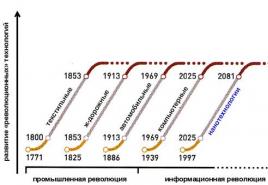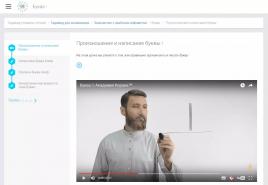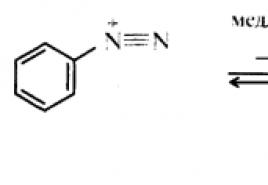Environment protection. Environmental protection in the modern world The issue of construction and health care in environmental protection
Currently, there are many, many environmental problems, but if everyone started to contribute a little, it would have a significant impact on the health of our planet! Children today have many more opportunities than before to help save our planet from pollution and waste. Thanks to the Internet, you have more resources at your fingertips than your parents at your age could have found in an entire library. Read this article and you will learn about some interesting and useful things you can do for our planet.
Steps
At home
- Different areas have different recycling options, so find out what can and cannot be recycled in your area. You can usually at least recycle paper, thin cardboard (such as milk cartons and shopping bags), thin metal (such as soda cans), and glass. In some regions, it is possible to recycle thick cardboard, foam, and other materials.
- Organize recycling. Make sure bottles, glass and tins are clean enough. They don't have to be sparkling clean, but at the same time they don't have to be half full. Then sort the waste by type. If you use separate containers for each type of waste at home, it will be easier for you to properly sort your waste for recycling. Even if you don't have such containers at home, you can still sort your waste to get an idea of how much of each type of material your family uses each day.
- Do this regularly. Depending on how large your family is, this may become a weekly task, or you may need to dedicate a little time to it each day.
- If a special machine regularly picks up waste for recycling, do not forget to place the sorted waste outside in advance.
-
Think about what you personally use and wear out. Children grow out of clothes, grow up and stop using toys and other things. Try to wear things and use other items for as long as possible. If you decide to buy yourself a new backpack just because you are tired of the old one, know that you are wasting the precious resources of our planet. The same can be said for literally everything you use. Take care and appreciate what you have.
Reduce your energy consumption. The energy that is used in your home for things like hot water, air conditioning, and electricity is produced in various power plants that process certain types of fuel to turn them into energy. Some fuels are cleaner than others, for example hydroelectric power (energy from flowing water) is cleaner than energy produced by burning coal; but regardless of the method, energy extraction adds to the burden on the environment. Do your part to protect the environment by using as little energy as possible.
- Turn off lights and electronic devices (such as the TV and games console) when you are no longer using them. However, before turning off the family computer, ask your parents - sometimes the computer may need to be left on for various reasons. During the day, open curtains and blinds and use natural light instead of electric light.
- Keep the temperature in your home at a moderate level. If you have an air conditioner at home, ask your parents to set it to at least 22°C in the summer. If you have a thermostat at home, do not set it above 20°C in winter (blankets and warm clothes will keep you warm when the house is cool.) At night, set the thermostat to 13 degrees in rooms where no one is sleeping.
- If you live in a cold region, do not set your thermostat below 13 degrees in winter, otherwise the pipes may freeze at night.
- Use less water. Take short showers instead of baths, and turn off the tap when not in use, such as when brushing your teeth. Even little things like this count!
- Ride a bike. The bicycle is perhaps the most environmentally friendly form of transport ever invented (after walking). If you cycle to and from school and anywhere else, you will be doing our planet a great service.
-
Start reusing a lot of things. Ask parents to buy 3-4 reusable shopping bags. They're inexpensive, but they'll help reduce the number of paper or plastic bags you bring home from grocery stores. As for your personal items, start using a reusable lunch box at school, unless you already do so. They also look cooler than paper bags. Ask for a reusable drink bottle as well. A bottle made of metal or durable plastic works great.
- Be sure to rinse and wash your reusable bags and shopping bags about once a week to prevent them from becoming dirty and greasy. Give them a quick scrub in the sink with a rag or sponge and leave them on the dish drainer for a couple of hours.
- Use unwanted plastic bags as garbage bags in the bathroom or in your room. They fit nicely into small trash cans, eliminating the need to buy special plastic trash bags.
- When choosing plastic water bottles, make sure it is made without BPA (bisphenol A). Then it can be used repeatedly. Plastic bottles containing BPA are not safe to use for long periods of time.
-
Pull weeds instead of spraying chemicals. Some people use herbicides to get rid of weeds in their garden or flower bed. Because the soil is softer there, there is no need for chemicals. Take gardening gloves, a hoe and a garden trowel and remove the weeds by hand. Do this every weekend. It's a great way to spend time outdoors with your family, and it's much cleaner and safer than herbicides.
Populate your garden with beneficial insects. Along with insect pests (such as aphids), there are other insects that feast on pests. Some gardening stores sell insects such as lacewings (which love to eat aphids and are also beautiful to look at). Rely on natural remedies, and then you will have to use pesticides much less often.
- Leave beneficial insects where you find them. In many cases, there are already guard insects in the garden. For example, garden spiders eat all kinds of pests, and at the same time they are absolutely safe for plants. When you find such insects, do not get rid of them - let them help you.
Help with recycling. Recycling programs are becoming more popular and accessible. With their help, you can clean and recycle certain types of waste. In this way, materials can be reused, and manufacturers no longer need to extract more natural resources. Help adults sort waste and recycle it regularly.
Family and school projects
-
Clean up the nearest park. Gather a group of friends or choose a day when your whole family can go to a nearby park in the morning. Bring several large trash bags and gardening gloves. Start in the parking lot and walk along each path in the park, picking up any trash you find. In a couple of hours the park will be immaculately clean!
- If you see trash not on the path, don't hesitate - go and collect it. If it's hard to reach, find a branch and pull it up.
- It may not look like anything exciting, but it is actually a wonderful experience. You may even enjoy it so much that you want to do it on a regular basis and clean the park again once or twice a year.
-
Join a larger cleanup operation. If you ask teachers and watch the local news, you may well learn that there are other groups of people doing cleanup operations similar to the park cleanup project. In most cases, these people are happy for children and families to join them. This way you can participate in cleaning up a beach, a campground, or a mountain trail. Being part of a larger movement is very inspiring.
-
Join other volunteer groups. Whether you like to plant trees, clear trails, or simply spread awareness about environmental changes in your hometown, there's a good chance there's a local group that shares your interests. Reach out to them and ask how you can help. If there is no such group, why not talk to your parents or school about starting one yourself? After all, you can't be too young to make a difference in the world.
- If your friends share your interests, ask them to sign a statement for the school principal. If the director knows that many people are interested in the project, he will be more likely to consider your proposal.
- One program that many schools can use, but few schools actually use, is a compost program. Compost helps reduce waste. Composting separates out food waste and yard waste, which then breaks down and turns into soil. With enough interest, your school's compost program can be a great success, so start spreading the word and gaining support among your classmates and their parents.
- Yes, balloons are usually made of biodegradable material, but at various events it is better to inflate them rather than use ones filled with helium. Inflating balloons is not only fun, but it is much more environmentally friendly than using helium.
Environmental protection is one of those global problems, the solution of which requires a comprehensive and widespread solution, the introduction of a set of effective measures to restore natural resources, prevent pollution of the world's oceans and atmosphere, etc. For centuries, people have been thoughtlessly wasting natural resources, and today the time has come when we realize that the planet’s reserves are not endless and require not only rational use, but also restoration.
The main factors that environmentalists pay attention to are the provoking thinning of the ozone layer of the atmosphere and leading to the “greenhouse effect”, the discharge of harmful substances into the world ocean, which causes the death of its inhabitants, and an increase in the volume of industrial waste that does not decompose. The incident at the BP oil development that led to this one showed how much more extensive protection is needed in the oil and gas complex. After all, it is in this sector of industry that any accident leads to horrific consequences from which nature cannot recover for years.
Today, environmental protection is one of the most important issues addressed by governments and most countries of the world. Scientists are looking for more gentle technologies for the production and processing of raw materials, developing complexes for their subsequent recycling or reuse, exploring the possibilities of reducing the amount and concentration of harmful emissions into the atmosphere, trying to use safe energy sources and more environmentally friendly types of fuel.
It is the unfavorable environmental situation that affects not only natural

resources, but also on human health: the average life expectancy of people is decreasing, the number of babies born with developmental pathologies or congenital diseases is increasing, the number of infertile couples and cancer patients is growing. It was these disappointing statistics that became the reason for developing a set of measures aimed at changing the current situation.
Protection in Russia in recent years has become one of the priority areas of the state’s domestic policy. It involves the development and implementation of new, safe production technologies, measures for the restoration of natural resources (new forest plantings and limitation of logging, restoration of the number of inhabitants of reservoirs, rational use of subsoil, reuse of various raw materials, etc.). Along with these measures, the number of environmental protection zones, national parks and reserves is increasing.

The State Committee for Nature Protection is called upon to regulate and control the use of resources. His direct responsibility is to develop regulations, requirements and rules. Only in our country are environmental law norms included in the basic law of the state - the Constitution. In addition, in order to properly use resources in various sectors, the Subsoil Law, as well as the Water, Forestry and Land Codes, have been developed. Despite the fairly large number of environmental departments, environmental protection in our country is not yet sufficiently developed. And this is not so much a shortcoming of state power as each person’s own attitude towards the world in which he lives.
Man and nature are not a parity relationship, since the dominant role belongs to nature. Nature is the whole world that surrounds man, it is the cradle of life in different forms and meanings. Everything that exists, the environment around us, can exist in living and inanimate form, but this world influences our lives in various manifestations.
The interconnections and patterns of interaction of all things were noticed in ancient times and were part of human philosophy. The rapid development of technological progress, the desire to subjugate nature - all this has brought to the fore issues of conservation ecology and environmental protection.
The most powerful factories are being built, giant stations are being built, the length of gas and oil pipelines is growing every day. All this is part of technological progress for the benefit of humanity, but the flip side of this progress is the death of forests and changes in landscapes.
For many years we have consoled ourselves with the thought that man is the master of nature, but it is his “management” that leaves behind lifeless spaces, barren deserts, destroyed ecosystems and contaminated water bodies. Deplorable condition ecology and environmental contamination does not allow modern human society to enjoy the freshness of the sea tide, the clean breath of the forest space, and the crystal water of the source.
This is how we changed nature. Explosions of nuclear power plants, rivers of flowing gasoline, wastewater from factories and plants, smog from exhaust gases, depletion of blue ribbons of rivers, deforestation. And if a reasonable person does not realize responsibility for state of ecology and environment, what will he leave behind on the blue planet?
Today, these issues concern many people who unite in “green” societies and environmental unions. After all, only through joint efforts are we able to revive and preserve natural resources and bear responsibility for all life on our planet, for our home - the cradle of life.
Environment and its protection
The current state of the environment requires protection through the law and a whole system of environmental regulations. Environmental protection and ecology must limit the destructive and destructive influence of humans on the environment. Many countries and communities in the modern world have introduced special measures to ensure environmental protection.
Strict restrictions on emissions of substances and harmful gases into the hydrosphere and atmosphere have been introduced. The creation of specialized unique reserves, national parks, and wildlife sanctuaries is organized and financed. Restrictive measures on fishing are being introduced, and hunting seasons and sizes are being reduced. The problem of garbage and industrial waste is solved using modern methods and processing technologies.
Since 1972, the UN Global Assembly has declared June 5th as World Environment Day. The choice of this date is not accidental, because it was in 1972 that the Stockholm Conference considered serious Environmental issues. This day is a call for annual special events by states and organizations aimed at preservation of ecology and environment.
On June 5, Russia also celebrates “Ecologist’s Day,” but every inhabitant of the Earth must remember that a healthy environmental ecology– these are not holidays, but actions. Failure to maintain environmental balance can lead to tragic consequences.
Depressing forecasts
- The annual increase in the area of deserts amounts to 27 million hectares, which leads to catastrophic losses of fertile soil for all mankind. All of Australia's wheat fields combined represent the amount of land lost to agriculture every year.
- Only 3% of the population in 1800 lived in cities, 50% of urban residents were recorded in statistics in 2008, and by 2030 the concentration of people in cities will be 60%.
- Information technologies are already a consequence of the entry of 2% CO2 into the Earth's atmosphere, which exceeds the volume of carbon dioxide emissions from aviation activities. Expected forecasts are disappointing and it is assumed that developments in the field of Internet technologies will increase CO2 emissions into the atmosphere by 20% by 2020.
- According to biologist Wilson from Harvard University, 30,000 species of diverse living organisms disappear from the face of the Earth every year, and the end of the millennium at this rate will be marked by the irreversible loss of half of the current biodiversity.
- Irrational development of various deposits by the end of this century may cause the complete depletion of the Earth's mineral resources.
- The area of primary forests, which provide habitat for 3/4 of all biological species on the planet, has decreased by 20% over the past 40 years, and continues to decline rapidly.
- The planet's coral reefs have shrunk by 30% and the destruction of unique ecosystems continues.
- Natural disasters and catastrophes on the planet from 2000 to 2006 inclusive increased by 187% compared to the previous decade. And this is the planet’s response to our attitude towards it.
- Z pollution of groundwater ecology becomes a potential threat to pollute 97% of the planet's fresh water supplies.
- Influence ecological situation on the environment will lead to the complete disappearance of snow on Kilimanjaro by 2033.
- Global warming is intensely affecting permafrost, causing Russia to lose 30 square kilometers of land each year.
Ecology, environment and industrialization
The above facts show how industrial progress affects ecology and pollution environment. Our planet can no longer be proud of clean air, fertile soil and “living” water. Almost every city is similar to one another with a huge number of cars, factories and factories.
Industrial activity, producing by-products, kills all life on the planet. Acid rain, global warming, thinning of the ozone layer - the list is quite long, which consists of many minor violations, non-compliance with standards, and negligence.
All this negativity, and the processes associated with it, are caused by a huge amount of pollutants that enter the atmosphere from industrial enterprises. Cities devoid of vegetation are suffocated by smog. Diesel and gasoline engines of automobile transport poison the air every day.
Huge tracts of forests - the lungs of the planet - are mercilessly destroyed in favor of industrial growth. The oxygen balance is disrupted not only in a single country, but throughout the entire planet.
Many animals, birds and plants are listed in the Red Book, others are teetering on the brink of extinction, because the animal world has not only become a source of food for humanity, but a product of greed and entertainment.
Floodplains of rivers and lakes turn into deserts, salt marshes, and stinking puddles. Birds no longer find refuge along the food-rich banks of rivers and lakes. Fish stocks are depleted or killed by oil spills. We can partially observe the once rich fish populations only in aquariums.
And for this there is no need to read frightening press reports; at every nearby body of water we can observe a depressing picture of pollution and irresponsible attitude towards ecology and environment. What other “horror stories” are needed so that every person understands that destroying nature is not ethical, not fashionable, but dangerous?
Environmental education
Undoubtedly, problems of ecology and environment must be resolved at the global level, using legislative, organizational, sanitary, hygienic, engineering and other measures and levers. But, you can start now to take good care of your home - the Earth within your home, district, city.
For example, in the Murmansk region, at the children’s and youth library, activists of the organization “Nature and Youth” held a mass master class on making ecological bags using the Japanese Furoshiki technique.
The Furoshiki technique allows you to use a square piece of fabric as a container for carrying various objects of various sizes and shapes. The purpose of this event was the great desire of the younger generation to abandon plastic bags as items that pose a danger to the environment.
With a little imagination, a lot of money and resources are saved on the production of unnecessary plastic, without harming the environment. “Let's save the planet together” - these were the slogans of this day, where employees of the organization informed children and parents about the destructive impact of anthropogenic impact on nature and the need environmental protection from ourselves.
You can start small, and even such a contribution to protecting the environment and improving the environment will improve our future.
In the history of the formation of the environmental concept, several stages can be distinguished: species and reserve conservation of nature - resource-based protection - nature conservation - rational use of natural resources - protection of the human environment - protection of the natural environment. Accordingly, the very concept of environmental protection activities expanded and deepened.
Protection of Nature - a set of state and public measures aimed at preserving the atmosphere, flora and fauna, soils, waters and subsoil.
Intensive exploitation of natural resources has led to the need for a new type of environmental protection activity - regional use of natural resources, in which protection requirements are included in the very process of economic activity using natural resources.
In the 50s XX century Another form of protection arises - protection of the human environment. This concept is close in meaning to nature conservation, puts the person in the center of attention, the preservation and formation of such natural conditions that are most favorable for his life, health and well-being.
Environmental protection - a new form of interaction between man and nature, born in modern conditions, it represents a system of state and public measures (technological, economic, administrative-legal, educational, international) aimed at the harmonious interaction of society and nature, the preservation and reproduction of existing ecological communities and natural resources for the sake of living and future generations.
In recent years, the term “protection of the natural environment” has been increasingly used. Environmental protection is closely related to environmental management - one of the branches of applied ecology.
Nature management - social and production activities aimed at satisfying the material and cultural needs of society through the use of various types of natural resources and natural conditions.
Environmental management includes: a) protection, renewal and reproduction of natural resources, their extraction and processing; b) use and protection of natural conditions of the human living environment; c) preservation, restoration and rational change of the ecological balance of natural systems; d) regulation of human reproduction and the number of people. Environmental management can be irrational and rational. Irrational environmental management does not ensure the preservation of natural resource potential, leads to deterioration of the quality of the natural environment, is accompanied by pollution and depletion of natural systems, disruption of ecological balance and destruction of ecosystems. Rational environmental management means the scientifically based use of natural resources, which achieves the maximum possible conservation of natural resource potential, with minimal disruption of the ability of ecosystems to self-regulation and self-healing.
According to Yu. Odum, rational environmental management has a twofold goal:
To ensure a state of the environment in which it could satisfy, along with material needs, the demands of aesthetics and recreation;
Ensure the continued production of useful plants, animals and various materials by establishing a balanced cycle of use and renewal.
At the current, modern stage of development of the problem of environmental protection, a new concept is born - environmental Safety, which is understood as the state of protection of a person’s vital environmental interests and, above all, his rights to a favorable natural environment.
The scientific basis for all measures to ensure the environmental safety of the population and rational environmental management is theoretical ecology, the most important principles of which are focused on maintaining the sustainability of ecosystems.
Ecosystems have the following limiting boundaries (existence, functioning), which must be taken into account during anthropogenic impact:
Limit anthropotolerance - resistance to negative anthropogenic impacts, for example, the effects of pesticides harmful to mammals and avifauna, etc.;
Limit stochetolerance - resistance against natural disasters, for example, the impact on forest ecosystems of hurricane winds, avalanches, landslides, etc.;
Limit homeostasis - self-regulation abilities;
Limit potential regenerativeness, i.e. the ability to self-heal.
Rational environmental management should consist of increasing these limits as much as possible and achieving high productivity of all links in the trophic chains of natural ecosystems. Balanced environmental management is possible only when using a systematic approach that takes into account all types of relationships and mutual influences between environments and people.
Irrational environmental management ultimately leads to an environmental crisis, and environmentally balanced environmental management creates the preconditions for overcoming it.
Way out of the global environmental crisis - the most important scientific and practical problem of our time. The task is to develop a set of reliable anti-crisis measures that will make it possible to actively counteract further degradation of the natural environment and achieve sustainable development of society. Attempts to solve this problem by any means alone, for example technological ones (sewage treatment plants, waste-free technologies, etc.), will not lead to the necessary results. Overcoming the environmental crisis is possible only under the condition of the harmonious development of nature and man and the removal of antagonism between them. The most general principle or rule of environmental protection should be considered the following: the global initial natural resource potential is continuously depleted in the course of historical development, which requires scientific and technological improvement from humanity aimed at wider and fuller use of this potential.
From this law follows another fundamental principle of protecting nature and the living environment: "environmentally friendly - economical", that is, the more economical the approach to natural resources and habitat, the less energy and other costs are required. Reproduction of natural resource potential and efforts to implement it must be comparable with the economic results of the exploitation of nature.
Rice. 11.1 Ways out of the environmental crisis
Another important ecological rule is that all components of the natural environment - atmospheric air, water, soil, etc. - must be protected not individually, but as a whole, as unified natural ecosystems of the biosphere. Only with such an ecological approach is it possible to ensure the preservation of landscapes, mineral resources, and the gene pool of animals and plants.
basic principles of environmental protection are the following:
The priority is to protect human life and health;
Science-based combination of environmental and economic interests;
Rational and sustainable use of natural resources;
Payment for environmental management;
Compliance with the requirements of environmental legislation, the inevitability of liability for its violation;
Transparency in the work of environmental organizations and their close connection with public associations and the population in solving environmental problems;
International cooperation in the field of environmental protection.
The most important environmental principle - scientifically based combination of environmental and economic interests - corresponds to the spirit of the UN International Conference in Rio de Janeiro (1992), where a course was taken towards a model of sustainable development of society, a reasonable combination of environmental and economic components, and the preservation of the natural environment along, together with economic growth.
The environmental crisis is not an inevitable and natural product of scientific and technological progress; it is caused both in our country and in other countries of the world by a complex of reasons of an objective and subjective nature, among which not the least is the consumerist, and often predatory attitude towards nature, neglect of fundamental environmental laws.
The first direction should be named improvement of technology - creation of environmentally friendly technology, introduction of waste-free, low-waste industries, renewal of fixed assets, etc.
Second direction -development and improvement of the economic mechanism environmental protection.
The third direction is the use of administrative measures and measures of legal liability for environmental violations administrative and legal direction.
The fourth direction is the harmonization of environmental thinking environmental and educational direction.
Fifth direction - harmonization of environmental international relations international legal direction.
Certain steps to overcome the environmental crisis in all of the above five areas are being taken; however, the most difficult and critical sections of the path remain to be overcome.







